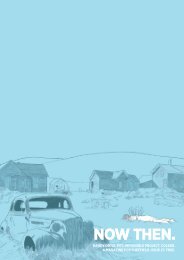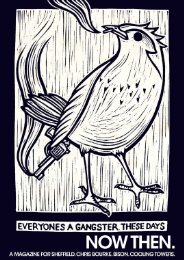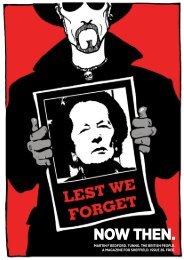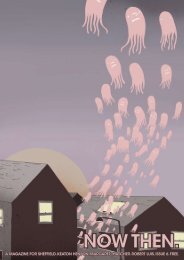You also want an ePaper? Increase the reach of your titles
YUMPU automatically turns print PDFs into web optimized ePapers that Google loves.
My colleagues for the sleep-out had given up their<br />
wallets for a “rough sleeper pack” at ten in the morning. I<br />
couldn’t join until 4 in the afternoon. By that time there was<br />
already something different about them. All concerned<br />
were professional people used to freedom of access to<br />
all the usual services, yet in the six hours they had spent<br />
without cash and unable to function as themselves they<br />
had changed. It is hard to say how they had changed<br />
except that there was a sense of vigilance, a sense of being<br />
careful about what they were doing, a sense of being out of<br />
place. But why?<br />
Their story was fascinating. It was a wet day so they had<br />
headed for places of shelter. First stop was the bus station.<br />
With nothing to do it seemed as good a place as any. After<br />
a while a station “security” person approached and asked<br />
their destination. They openly admitted they didn’t have<br />
one. Shortly afterwards, the security person returned with<br />
a colleague and informed the group they had to leave,<br />
informing them the bus station was for people catching<br />
buses not loiterers. As they had done nothing untoward<br />
the group were surprised. On hearing the story I wasn’t so<br />
surprised. Some of the homeless community I work with<br />
cause a real nuisance around the city centre. Begging (and<br />
the potential harassment of customers that goes with it)<br />
isn’t an image any service manager wants associated with<br />
their business. However, for the first time I started to question<br />
whether nuisance preceded exclusion, or whether exclusion<br />
was a cause of people becoming a nuisance.<br />
Homelessness is a subject that many<br />
more people will be learning about in<br />
our society as the credit crunch claims<br />
more and more family homes. Friends,<br />
neighbours and families may be caught<br />
up in how to help those in a seemingly<br />
desperate situation, people who have<br />
to cope in practical ways having been<br />
through emotional hell.<br />
One of the intriguing and unfathomable aspects of<br />
homelessness is the effect on the spirit and mind of those<br />
caught, and beyond that the long-term beliefs that people<br />
grow to have and hold. From my experience of working<br />
with the homeless community it is these self perceptions<br />
that become the most stubborn obstacle to moving away<br />
from homelessness all together. Last year I spent one night<br />
on the streets - just one night - and was surprised to find<br />
that twenty-four hours of pseudo-homelessness can be<br />
profound.<br />
I believe two things made the experience more profound.<br />
Firstly, it was a wet November day-night. A cold wet night<br />
forces reality to stare you in the face and reality means<br />
you have to use the shelter, warmth and safety that the city<br />
offers. <strong>In</strong> my case shelter and safety both felt precarious.<br />
Secondly, I was part of a group. The group didn’t stay as<br />
one all of the time, but it meant that I was never alone.<br />
Looking back I can see how easy it would have been for<br />
me by myself to disappear for such a brief period of time.<br />
Homeless people are seldom loners; one of the reasons for<br />
some finding their way into the community, perversely, is<br />
companionship. Alone, I would have avoided some of the<br />
situations the group couldn’t avoid.<br />
At four in the afternoon the train station proved a good<br />
place for shelter. The rush hour afforded excellent cover. We<br />
stayed until seven, maybe eight o’clock. It was here that the<br />
lack of an activity seemed to weigh down on us. The station<br />
was full of those who had a purpose; commuters waiting<br />
for a train, anticipating an evening ahead. Whatever they<br />
anticipated didn’t really matter. It may have been domestic<br />
bliss or drudgery, work or leisure, chore or pleasure.<br />
The point we became aware of was that all we were<br />
trying to plan was to do nothing somewhere, anywhere.<br />
Having activity stripped from us is still one of that night’s<br />
experiences that I think about most.<br />
Whether our occupations leave us satisfied or dissatisfied<br />
they do help define who and what we are. If we are<br />
employed we are, therefore, employable. We have a<br />
purpose and we achieve an end product of some kind or<br />
other. Even those who do not like their jobs can talk about<br />
how well they do them or how poorly or well a colleague<br />
does the same thing. Having nothing to do with nowhere to<br />
go brings a wholly negative definition. It was this that I had<br />
perceived about the group when I had joined them. Their<br />
lack of purpose had caused suspicion, it had challenged<br />
them in a way that achieving a purpose does not. They had<br />
begun to carry this negativity as part of themselves.<br />
It reminded me of something I had said to a reporter<br />
covering an event we held to highlight the plight of the<br />
homeless. I had said that the most difficult part of our<br />
work was changing peoples’ self-perceptions. A common<br />
belief amongst many in the homeless community is that<br />
their current life is all that exists for them and that a better<br />
life just isn’t a real possibility. It isn’t a lack of ambition;<br />
many speak of a desire to change and of what they might<br />
achieve. It is a more a deep and often hidden belief that<br />
ambitions just won’t be realised. Messages of failure<br />
and unworthiness received from their earliest childhood<br />
memories have reinforced this belief. My surprise was that,<br />
in such a short period of time, the negative feel about life on<br />
the streets had affected a group of professional people with<br />
proven abilities who had a home and a job to return to the<br />
following day.<br />
TIM RENSHAW.<br />
A night on the town.<br />
STORIES FROM THE STEEL CITY STREETS.<br />
PAGe eleven.












